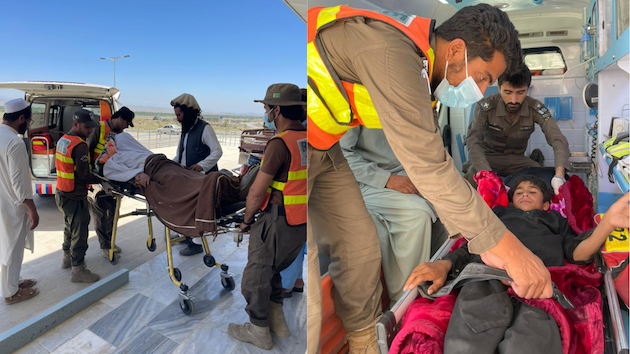Iraq must seize ‘brief window of opportunity’ to turn tide of instability — Global Issues
Highlighting recent achievements and challenges ahead following a year of tensions and political discord, Jeanine Hennis-Plasschaert said the hope is that the confirmation of the new Government will provide an opportunity to structurally address the many pressing issues.
‘Glass half full’
“Effecting meaningful change will take time, as this can only happen through structural change that requires systemic socio-economic reform, stronger institutions and better governance at all levels,” she said. “No one can expect Iraq’s challenges to be resolved overnight, but I’d also like to see the glass half full.”
Ms. Hennis-Plasschaert also heads the UN Assistance Mission for Iraq (UNAMI), a special political mission established in 2003. Its current mandate includes providing advice, support and assistance to the Government and people of Iraq on advancing inclusive political dialogue and reconciliation.
Joint responsibilities
“The legacy of the past and the many challenges of the present will take time; no Government can go it alone,” she said, recalling the tumultuous past two decades, including the 2003 bombing of UN headquarters in Baghdad that killed 22 and injured 150 people only days after UNAMI was established.
“It is of the greatest importance that political parties and other actors prioritize the country’s interest above all else,” she said. “At the end of the day, it is and remains a joint responsibility.”
New Government’s achievements
She said that in the first three months in office, Prime Minister Mohammed Shia al-Sudani has shown commitment. The new Government is tackling the most pressing challenges, including poor public service delivery and high levels of unemployment.
Efforts are also under way to improve public service delivery and fight insidious systemic corruption, including on the recovery of stolen funds and related investigations, she said. She expressed strong support for the Prime Minister’s endeavour to make the country a platform for dialogue and investment.
Systemic change is vital
Accountability and managing public expectations are essential, she said, adding that systemic change will prove vital.
“Overpromising and underdelivering can have dire consequences,” she cautioned, “and sugar-coating the situation will only add to feelings of frustration and disillusion.”
Challenges ahead
Drawing attention to areas of concern, she said delays in much-needed economic reform are palpable, adding every-day pressure on the Iraqi people. Human rights must also be upheld.
“Genuine commitment to human rights is pivotal to any country, including Iraq,” she continued. “Silencing, obstructing, dismissing or undermining constructive criticism tarnishes the image of the State and erodes public trust.”
Instead, encouraging public discourse enables institutions to flourish and adapt, she added.
Attention is also needed in other vital areas, from significant environmental challenges to the transition from a humanitarian response to development.
Turning to Baghdad-Erbil relations, she said the Iraq Government is committed to resolving differences, including introducing oil and gas legislation. However, swift compromises on outstanding fiscal, administrative, security and electoral disagreements are urgently needed to bridge divisions among ruling parties in the Kurdistan Region. The parties “cannot afford to lose more time,” she said.
Recalling her previous Council briefing in October, the Special Representative reiterated that the window to act on several key issues will only be open for a short time. In that vein, she encouraged the Government to take the necessary steps.
Mine action obstacles
Also briefing the Council, civil society representative Dr. Ahmad, of the Iraqi Health and Social Care Organization, said explosive ordnance remains a major obstacle to stabilization efforts and development.
Indeed, Iraq is one of the most ordnance contaminated countries in the world. The UN Mine Action Service (UNMAS) reports that Iraq has approximately 2,995 square kilometres of recorded contaminated areas.
“The Mine Ban Convention obligations will not be met in the current conditions,” Dr. Ahmed said.
Citing recent deadly incidents, he pointed to an International Organization for Migration (IOM) report that 1.2 million Iraqis are still displaced, with a slow return rate, as many say they cannot return to their homes due to ordnance contamination.
Rethinking and planning programmes with partners must be aligned with national efforts and expedited, he said. Currently, mine-action plans completed in mid-2022 are still awaiting the Government’s endorsement.
Lately, due to various factors, donor funds are dwindling, threatening ongoing efforts, he said. New priorities for donors in the post-COVID-19 era exist, however, Iraq still faces enormous challenges. As such, national non-governmental organizations have been deeply affected and their survival is really at stake.
Civil society needs support
Civil society needs support to contribute to a functioning democratic system, he said. Localization must be about ownership and empowerment, requiring effective planning and ensure strategic factors are integrated in programmes.
The development of mine-action programmes is not a journey, but a destination, he said, emphasizing that the stark gap between rhetoric and action must be addressed.
Check out our Latest News and Follow us at Facebook
Original Source







